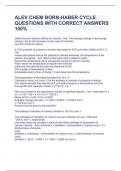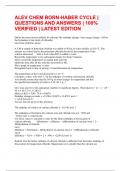Born haber cycle - Study guides, Class notes & Summaries
Looking for the best study guides, study notes and summaries about Born haber cycle? On this page you'll find 53 study documents about Born haber cycle.
All 53 results
Sort by
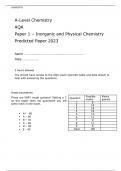
-
A-Level Chemistry AQA Paper 1 – Inorganic and Physical Chemistry Predicted Paper 2023
- Exam (elaborations) • 37 pages • 2023
-
- $10.49
- 1x sold
- + learn more
A-Level Chemistry AQA Paper 1 – Inorganic and Physical Chemistry Predicted Paper 2023 Name …………………………………………………………………… Date ………………… 2 hours allowed You should have access to the AQA insert (periodic table and data sheet) to help with answering the questions. Grade boundaries These are VERY rough guesses! Getting a C on this paper does not guarantee you the same mark in the exam. • A* - 90 • A – 80 ...
ALEV CHEM BORN-HABER CYCLE QUESTIONS WITH CORRECT ANSWERS 100%
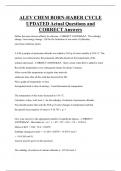
-
ALEV CHEM BORN-HABER CYCLE UPDATED Actual Questions and CORRECT Answers
- Exam (elaborations) • 8 pages • 2024
-
- $9.49
- + learn more
ALEV CHEM BORN-HABER CYCLE UPDATED Actual Questions and CORRECT Answers Define the term electron affinity for chlorine - CORRECT ANSWER- The enthalpy change / heat energy change / ΔH for the formation of one mole of (chloride) ions from (chlorine) atoms A 5.00 g sample of potassium chloride was added to 50.0 g of water initially at 20.0 °C. The mixture was stirred and as the potassium chloride dissolved, the temperature of the solution decreased. - CORRECT ANSWER- Start a clock when ...
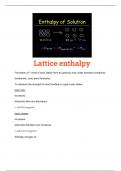
-
lattice enthalpy and entropy, born haber cycles chemistry notes
- Summary • 9 pages • 2024
-
Available in package deal
-
- $4.08
- + learn more
summary notes on lattice enthalpy, born-haber cycles, enthalpy of solution, entropy and free energy and feasibility. including example calculations and diagrams from the textbook
ALEV CHEM BORN-HABER CYCLE | QUESTIONS AND ANSWERS | 100% VERIFIED | LATEST EDITION
![A-level CHEMISTRY Paper 1 Inorganic and Physical Chemistry Questions paper and marking scheme MERGED[A verified]](/docpics/5569596/6662cc1a3392b_5569596_121_171.jpeg)
-
A-level CHEMISTRY Paper 1 Inorganic and Physical Chemistry Questions paper and marking scheme MERGED[A verified]
- Exam (elaborations) • 73 pages • 2024
-
- $10.99
- + learn more
Materials For this paper you must have: • the Periodic Table/Data Booklet, provided as an insert (enclosed) • a ruler with millimetre measurements • a scientific calculator, which you are expected to use where appropriate. Instructions • Use black ink or black ball-point pen. • Fill in the boxes at the top of this page. • Answer all questions. • You must answer the questions in the spaces provided. Do not write outside the box around each page or on blank pages. • If ...
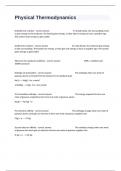
-
Physical Thermodynamics Exam Reported Questions Well Answered.
- Exam (elaborations) • 12 pages • 2024
-
Available in package deal
-
- $13.49
- + learn more
Endothermic reaction - correct answer To break bonds, the surroundings need to give energy to the molecule. The bonds gains energy, as they take in energy so have a positive sign. The system loses energy so gets colder Exothermic reaction - correct answer To make bonds, the molecule give energy to the surroundings. The bonds lose energy, as they give out energy so have a negative sign. The system gains...
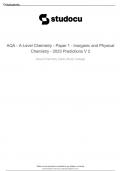
-
aqa-a-level-chemistry-paper-1-inorganic-and-physical-chemistry-2023-predictions
- Exam (elaborations) • 36 pages • 2023
-
- $17.49
- + learn more
aqa-a-level-chemistry-paper-1-inorganic-and-physical-chemistry-2023-predictionsA-Level Chemistry AQA Paper 1 – Inorganic and Physical Chemistry Predicted Paper 2023 Name …………………………………………………………………… Date ………………… 2 hours allowed You should have access to the AQA insert (periodic table and data sheet) to help with answering the questions. Grade boundaries These are VERY rough guesses! Getting a C on this paper does not gu...
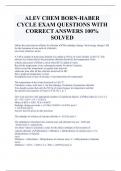
-
ALEV CHEM BORN-HABER CYCLE EXAM QUESTIONS WITH CORRECT ANSWERS 100% SOLVED
- Exam (elaborations) • 6 pages • 2024
-
- $10.49
- + learn more
ALEV CHEM BORN-HABER CYCLE EXAM QUESTIONS WITH CORRECT ANSWERS 100% SOLVED Define the term electron affinity for chlorine The enthalpy change / heat energy change / ΔH for the formation of one mole of (chloride) ions from (chlorine) atoms A 5.00 g sample of potassium chloride was added to 50.0 g of water initially at 20.0 °C. The mixture was stirred and as the potassium chloride dissolved, the temperature of the solution decreased. Start a clock when KCl is added to water Record ...
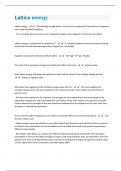
-
Lattice energy Questions And Answers | 100% Correct Answers | 2024 Updated Quiz
- Exam (elaborations) • 6 pages • 2024
-
- $7.99
- + learn more
Lattice energy - - The enthalpy change when 1 mole of ionic compound is formed from its gaseous ions under standard conditions - It is the energy given out when ions of opposite charges comes together to form an ionic lattice Lattice energy is endothermic or exothermic? - - It is always exothermic because bonds are being formed (ionic bond) between oppositely charged ions, not broken Equation showing the formation of NaCl lattice - - Na^+(g) + Cl^-(g) > NaCl(s) The state of the opposite...

How did he do that? By selling his study resources on Stuvia. Try it yourself! Discover all about earning on Stuvia

